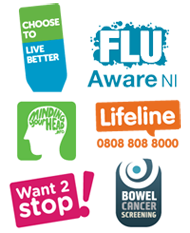Latest News
Take a few minutes to read an excellent article below - GAA’s Community and Health Manager, Colin Regan, speaks about his roll and the task ahead within the Association in relation to Health & Well Being. A lot of what Colin speaks of is already being addressed by St.Mary’s through our Healthy Club and ASAP initiatives.
Colin Regan, GAA Community and Health Manager
"We want to become an association where clubs provide an environment in which mental health is valued and respected just as much as physical health. We want to get to a point where clubs and counties provide exactly the same support and respect for someone with mental health issues as they would to someone who breaks their leg playing football.”
In
It is hard to grasp the mentality of those who feel driven to take their own lives, who feel that suicide is the only method of pain relief. People, particularly young people these days, can feel that they are drowning and no-one can even see them trying to swim.
In
Emotion is a frustratingly Irish taboo. What’s that line from Angela’s Ashes, when Frankie wants to chase his father and tell him he loves him? "In
That book was based in the 1930s and yet
But we do drink, and we drink too much a lot of the time. We do gamble, and we gamble too much a lot of the time. We do have mental health issues, but we don’t tell anyone how we’re feeling, often until it’s too late, until it’s in a note left to a grieving parent or girlfriend or wife or child.
Roughly 500 Irish people, many of them only teenagers, are lost to suicide, on average, every 12 months. That is the fourth highest rate in
It is a hard thing to prevent, for both the person suffering and those around them. Often times, friends, family, girlfriend, wife, won’t notice. Often the emotional hurt is so deep-rooted, so internalised, that it stays and bubbles quietly inside, and never makes it to the surface until it’s too late.
Every time suicide would be mentioned on TV, my mother would instinctively plead to the five of us: "Boys, no matter what happens, nothing is ever that bad.”
There are options. There are always options. And what the GAA, as an organisation, is setting about doing now is trying to provide its members with those options.
There are two main areas on which the National Health and Wellbeing Committee are focussing: the area of mental health, and the continuation of the Alcohol and Substance Abuse Prevention (ASAP) campaign, which has been ongoing since 2006.
From the start of 2014, every county will be required to set up its own Health and Wellbeing Committee. The idea came from Tyrone, who have had such a committee for the past two years, and put the idea to Congress last April.
"We want to reassure people as well that we don’t expect county boards, to take on the role of counsellors that have to go about solving all the ills of Irish society,” says the GAA’s Community and Health manager, Colin Regan.
"We want to put proper practices in play and make significant steps to improve the health and wellbeing of club members.”
Consultation with St. Patrick’s Hospital in
"We want to put it in familiar language, to emphasise mental fitness and breaking the taboo about mental health injuries. If your hamstring is damaged, you go to a physio. If you break your leg, you go to A+E. If you have a mental health ‘injury’, it needs to be treated as well.
"If people see that they have a problem and they open up, we can direct them to the right help. It’s like any illness, the easier you catch it, the less ingrained it is and the easier it is to treat,” said Regan.
Mental health problems and alcohol or substance abuse problems are not one and the same, but nor are they strangers.
"There is a strong link between the two. An enormous link. Most of the alcohol cases are in young men between 18 and 40, which is our playing population,” said the former Leitrim player.
The problem of alcohol, and to a lesser extent substance, abuse is deep-rooted in our society. So deep-rooted that what would be regarded as a problem in other countries is seen as a cracking weekend here.
"There’s a bravado around drinking,” says Regan.
"I go to clubs and do work on the alcohol side of things. You tell them that binge drinking is classified as more than six units in a night, which is just over three pints, and they laugh. They think ‘we do it all the time, that must be wrong.’ But you go to the continent, and that’s how they drink, two or three drinks.
"Don’t get me wrong, I played club and county football and I enjoyed the social side of it,” said the former Leitrim county star, and a former editor of the Leitrim Post newspaper.
"We’re not talking prohibition here. We’re talking about changes in terms of the attitude of people towards alcohol. We don’t want to be burying our heads in the sand, particularly in this new era, this communication age, where people tend to be more open. This era of communication is a dual-edged sword.
We all see it on Twitter and on Facebook, posts that appear to be subtle cries for help. Times I have looked at my feed and offered a thought to someone who posts "fml
It’s dangerous. Anonymity, and the cloak of invincibility that it provides, is a problem particular to the GAA at times, with message boards awash with the abuse of people with lives and feelings by people who have no names or identities.
"Some people feel very vulnerable in that social media setting, to live up to that false, stylised life that it can paint. People sometimes present that perfect life and perhaps their real life isn’t like that, and they feel pressure to live up to those high expectations.
"There have been a couple of high profile instances of bullying, which, because we have so many members, crosses into the GAA as well.
"People have this mentality that, because a lot of platforms allow you to be anonymous, you can say whatever you want about anyone and that there are no consequences.
"It has opened up the potential for communication and for people to stay connected, but there are definitely caveats of social media, "95 per cent” of the problems the ASAP programme deals with are alcohol related, with only 5 per cent substance related.
What social media can do, on the flipside, is allow the brave testimonies provided to the world by Cavan goalkeeper Alan O’Mara and
"It’s usually a mother, a sister, a girlfriend, a team-mate, a brother, a sister. They’ve maybe recognised some of the symptoms of depression, and they would think ‘Jaysus, that’s like our Jonny.’
"There’s also a thing that they maybe feel safe turning to the GAA, because it’s familiar, rather than maybe contacting a mental health agency. Those ‘milestone’ testimonies, if you like, have helped,
And then there is gambling. Even when Oisin McConville bared all in his book, ‘The Gambler’, it was a different age. The era of internet betting was only just taking off here, and not everyone had a Smartphone.
Now, you can throw away money betting on who will win the first throw in a Premier League game, who’ll get the most yellow cards, things that are in the lap of the Gods. It’s too accessible, too easy.
In over a third of the cases that GPA counselling services dealt with last year, inter-county players were seeking help for gambling problems.
"Gambling is a difficult one,”
"It’s coming up on the radar. We’re in the process of developing guidelines. We can’t provide people with the professional help that they maybe need but we can point them in the right direction,” he said.
This is all about trying to give young GAA members a steer back towards health. Just because you don’t have a broken leg or a pulled hamstring, it doesn’t mean you aren’t hurting.
Too many young people are going and leaving us because they feel that it’s the only way out. It’s not. If you need that help, take it. Please.
Colin Regan


